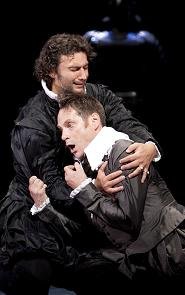|
|
|
|
|
|
|
|
| The Times, 16 September 2009 |
| Neil Fisher |
|
|
Don Carlo at Covent Garden
|
|
 A
significant smattering of doubts clustered around Nicholas Hytner’s
production of Verdi’s Don Carlo when it was new last year. Did Bob Crowley’s
prison-like sets, trapping the denizens of the Spanish royal court in their
dark cells, keep too much emotion behind bars as well? Did the spectacle
veer too closely to window-dressing in a piece that taps the big issues (the
power of State against Church, of idealism versus expediency) with such
directness? And, most importantly, could Covent Garden field a cast to
deliver all the nuances as imposingly as Verdi demands? A
significant smattering of doubts clustered around Nicholas Hytner’s
production of Verdi’s Don Carlo when it was new last year. Did Bob Crowley’s
prison-like sets, trapping the denizens of the Spanish royal court in their
dark cells, keep too much emotion behind bars as well? Did the spectacle
veer too closely to window-dressing in a piece that taps the big issues (the
power of State against Church, of idealism versus expediency) with such
directness? And, most importantly, could Covent Garden field a cast to
deliver all the nuances as imposingly as Verdi demands?
If these question marks can be discarded, there is one crucial reason.
The German tenor Jonas Kaufmann is now the eponymous Prince, whose search
both for love (hopelessly misdirected towards his stepmother, Queen
Elisabeth) and a vocation (haplessly exploited by his much cannier chum, the
Marquis of Posa), is destined to end in disaster. And it is Kaufmann’s
achievement not just to sing with such a thrilling range of vocal colour and
pliancy but to give this double tragedy such a personal slant.
Right from the start Kaufmann’s Carlos is a delicate flower: he’s touchingly
naive, almost schoolboyish, when first wooing Marina Poplavskaya’s Elisabeth
in Act I. Only when forced to give her updoes an introvert’s natural shyness
gradually warp. His attempts at rebellion look increasingly unhinged; cipher
Carlos may be by the time he is sobbing over Posa’s corpse and awaiting the
Inquisition, but Kaufmann never stops being anything other than raptly
compelling.
That this triumph is scored alongside a dramatic and vocal masterclass from
Ferruccio Furlanetto’s magisterial Philip II only attests to the skilfulness
of both performances. Coming from the opposite extreme of stiff-backed
authority, Furlanetto ends up in much the same plight, opening his lonely
Act IV lament with all the anguish of a wounded animal. In the face of John
Tomlinson’s terrifyingly implacable Grand Inquisitor, suddenly he seems
hauntingly vulnerable.
It is not just their show. Conducting, Semyon Bychkov has big shoes to fill
in following Antonio Pappano. At first I wondered if his approach was too
weighty, almost Wagnerian, but the dramatic momentum is inexorably and
thrillingly built up, and the playing is tremendous.
Hytner, too, perhaps because he has more grateful support, has focused a
show that now makes its central point — the suffocating embrace of religion
— less dogmatically. There is still a sense of self-consciousness to the
grand ceremony, and it’s odd that a director so immersed in theatre can’t
find a more imaginative way of presenting the lusty chorus than lining them
up in a row.
And the rest? Poplavskaya sings with feeling and commitment, and pulls out
all the stops for her big Act V aria, but her tone is on the thin side and
she needs to work on her tuning. Simon Keenlyside’s Posa is deft and
charismatic enough to project his light baritone a notch farther than it
probably should be. And Marianne Cornetti’s old-school powerhouse of an
Eboli is too unremitting a sing in this company. Those quibbles aside, this
revival is the Royal Opera at its best. |
|
|
|
|
|
|
|
|
|
|
|
|
|
|
|
|
|
|